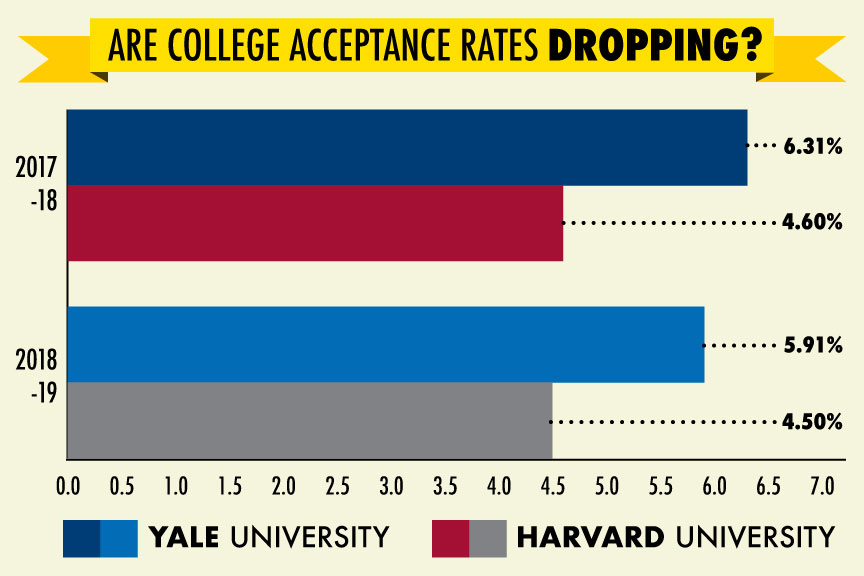College acceptance rates drop as stress rises
Elite colleges boast record low admission rates as competition gets tougher
The Varsity Blues scandal has shed light on how corrupt, dramatic, and cutthroat the college admissions process can be — and it is only getting more competitive. Many highly selective schools have announced that their acceptance rates decreased from 2018.
Yale and University of Southern California, both of which were involved in the Varsity Blues scandal, released their admission rates: Yale’s rate dropped from 6.31 percent to 5.91, while USC had an admission rate of just 11 percent, its lowest ever. Harvard’s rate of admission also dropped slightly to 4.5 percent from 4.6 percent last year.
College counselor Dan Rogan explained that this decrease is likely due to the influx of applications and will not have a large impact on students’ chances of getting into selective universities.
“A lot of it stems from the Common App and how easy it is to submit applications to multiple schools they wouldn’t think about otherwise,” said Rogan.
“It is also about the commercialization and commodification of the admissions process. It can become more about the ‘brand name’ of a college than the best fit,” he added.
When considering colleges with very low admission rates, students can feel the need to submit more applications in order to ensure they are accepted somewhere.
However, as admissions at top-tier institution goes down, the desire to attend these colleges only increases. As a result, students feel pressure to get perfect grades, delve into many extracurriculars, and eventually attend an elite college despite the odds.
“Teachers emphasize that the name of the school shouldn’t matter, but there is a lot of pressure among the student body. Sometimes everything can feel like it’s about college even when it shouldn’t be,” said senior Abby Wilson.
Senior Edward Seol agreed that applying to college can be intense and that this community can sometimes obsess over admissions.
“College admissions [pressure] really hit me in the face at the beginning of this year,” said Seol. “I am not the type to get nervous or impatient about results, but I experienced that too, especially during late February and into March.”
Seol also acknowledged that even though people might be disappointed by college admissions, there is no one perfect school for a person to attend.
“In a [high] school where so much value is placed on accomplishment, college admissions is assuredly going to be disappointing for many people. Students just have to become comfortable knowing that results will not be pretty for most and that many paths exist outside of the one they fixate on,” said Seol.
For junior Kate Fawcett, thinking about submitting her college applications in the next school year is nerve-racking because the end result is so unpredictable.
“I think that it is really stressful, because you can be a great student and be genuinely passionate about the things on your resumé and still not get to where you want to go,” said Fawcett. “I think sometimes there can be a feeling that you need to go to a top school to be successful, but that’s just not true.”
Senior Molly Van Gorp agreed that the college process can be stressful and emphasized it is different for everyone. Van Gorp applied early decision and committed to college before the end of first semester.
“It was great to know where I would be going earlier in the application process, but it also limited my options. Ultimately I am happy that I applied ED because it gave me clarity early on, allowing me to get excited and start planning for next year sooner,” said Van Gorp.
Van Gorp also stressed the importance of finding the school that best fits your personality, not the name of the college or its admission rate.
“Don’t come into the process with preconceived notions and don’t let others overly influence your decision making,” said Van Gorp.
There is a college that is a good fit for everyone out there, she emphasized.
This rang especially true for Wilson, who is excited to go to college in the fall even though her admission process did not look exactly like she thought it would.
“I’m actually grateful that I didn’t get into some of the places I applied to because it wouldn’t have been a good fit,” Wilson explained. While students do feel pressure to attend elite universities, the college you attend does not determine your future, she added.
“It’s not all about the name or the prestige,” Wilson said. “It’s about where you could be happy.”







































